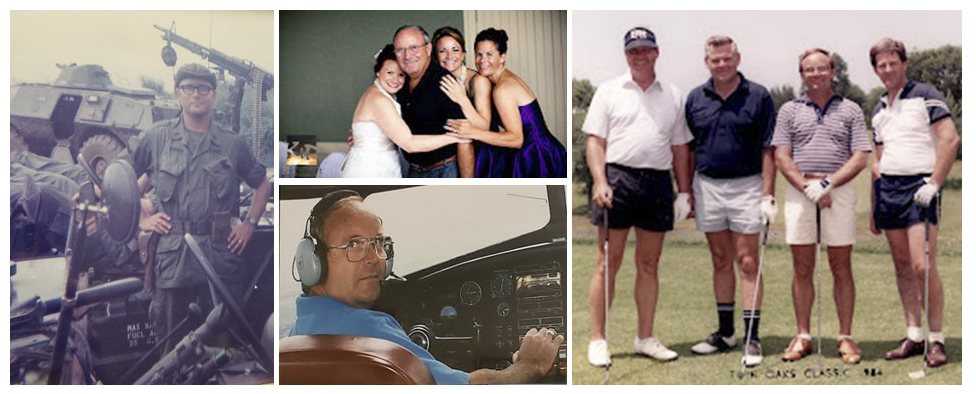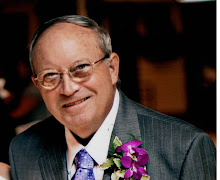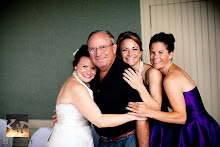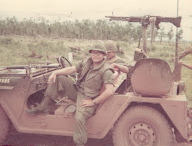
Mike Rankin was well-known in certain circles around Springfield as a banker and civic leader, for his volunteer service on many boards and fund drives, for his enthusiasm as a political supporter and as a sports fan.
But hundreds, even thousands hereabouts, didn’t know him by his proper name but rather as some variation of “The Shirtless Runner Guy.”
It was only one of several nicknames for Rankin, who died March 15 at age 76, after a 20-year ordeal with Parkinson’s disease. Other monikers included “Magnum” and “Sergeant at Arms.”
And those who knew him best, his family and close friends, called him loving and loyal and, in one dramatic episode, a life-saving hero.
To explain:
For more than 30 years, Rankin and three buddies — realtor Kirk Heyle and accountants Jim Lewis and Mike Phillips — regularly ran during the noon hour out of the old downtown YMCA.
“Pretty much five days a week,” recalls Lewis. “It didn’t matter what the weather was.”
Yes, says Heyle, “unless it was just awful weather, Mike would push us — kind of bully us, really — to go outside to run. He’d say ‘You don’t want to stay in here and run on a treadmill. Let’s go!’ So, rain or shine, most days we ran outside.
“And if it was at least 45 or 50 degrees out, Mike insisted on running without a shirt.”
When it was too cold for even him, Mike reluctantly would don something that was, um, distinctive. A vintage brown velour warmup suit, for instance.

“It might’ve fit him at one time, but it had to be something he’d worn in college,” says Lewis. “Every time he would put on that sweatsuit, we would tell him he needed to run a block in front of us or behind us because we didn’t want to be seen with him wearing it.
“He also had a Farrah Fawcett T-shirt that he would try to fit into. It was obviously from the ’70s, and it came nowhere close to fitting him. But he didn’t care. He’d say, ‘This shirt accentuates my 12-pack.’”
Their running route typically measured three or four miles — “In our heyday,” says Heyle, “we’d run at an 8-minute-mile pace” — and usually wound from downtown to the SMS/MSU campus and back. Mike’s eldest daughter, Heather, knows that all too well.
“One of my friends would say, ‘Hey, Heather, I think I saw your dad on campus today’ — and just immediately beads of sweat would break out,” she says, wiping her hand across her forehead at the recollection.
“And I’d say, ‘Oh, really?’ And they’d say, ‘He was wearing these really short orange shorts like a Hooters waitress, and he didn’t have a shirt on. He was just running through campus, waving at everyone. I’m sure it was your father.’
“I’d want to deny it, but I knew beyond a shadow of a doubt that they’d spotted Mike Rankin running on the Missouri State campus in his orange short-shorts, smiling and waving. …”
Daughters hold cherished memories

Heather, who lives in New Orleans, and her sisters, Ashley, who lives in Ozark, and Summer, who lives in Hawaii, gathered around the kitchen table of a southside Springfield house they bought to serve as a headquarters on visits to their old hometown. They talked excitedly, sometimes all three at the same time, as memories came tumbling out, punctuated by frequent laughter.
Some excerpts:
Heather: “He got the nickname ‘Magnum’ because, when I started dating, he’d go to the door to greet gentleman callers with a .357 magnum pistol tucked into his belt. Now, this is a man who went hunting — once — and came back and said he never wanted to go hunting again, ever, because he didn’t see the point of just killing an animal for sport. He thought it was awful. But the boys who came to date us didn’t know that. They just saw that .357 magnum, with one of his hands resting on it as he held out his other hand to shake. So I when I came back for my 20-year high school reunion, I-don’t-know-how-many people asked me, ‘How’s Magnum?’”
Ashley: “I had a horse, and when I was about 13, I rode it in a parade in Ozark. Dad insisted on coming along. I told him, ‘Dad, I’m fine, I can manage the horse by myself.’ But he insisted on walking beside us. And he’d rented some big fuzzy chaps from somewhere — they were white, covered with long sheep fur or something — and he walked the whole parade route wearing those huge chaps, and a cowboy hat, waving at everyone along the way.”
Summer: “He was very tech-forward, and he recorded everything. At first he had an 8-millimeter film camera, then a video camera. I have about the same amount of footage as the Library of Congress — everything about our lives as we were growing up. When we became bratty teenagers, we’d be like, ‘Dad, you don’t need to come to this basketball game. Please don’t come. Or if you do, pretend you don’t know me.’ But he would come every single time. Of course, now we’re so grateful that he did.”
Heather: “I did cheerleading, and he actually helped us. The first thing they’d ask at cheerleading practice was ‘Is your dad coming?’ because they wanted him to tape it. And then we’d watch it played back right there on the TV so we could see if we needed to adjust our formations or stunts or whatever.”
Summer: “I was involved with Little Theatre for almost 20 years. And when we had shows, he ‘d say, ‘Do you guys want me to tape the show and make copies for everybody?’ And they were like, ‘Yes, please!’ And so he became the sort-of de facto videographer-slash-photographer for Little Theatre for like 25 years.”
Ashley: “I majored in construction management at Missouri State. I needed an internship for a class, and so Dad and I built a spec house that qualified as an internship. He was my banker, of course, but he learned everything he could about construction. He could be kind-of scary with hammers — but it was something new that he’d never done before, and he thought it would be interesting to learn and have a new experience.”
All three sisters talking at once:
- “He took Spanish classes late in life — night classes at MSU. Maybe so if we went to Mexico he’d be able to talk to people. But it also goes back to his lifelong love of learning. He always wanted to be learning something new, learning a new skill.”
- “We all took piano lessons. His instrument was the guitar. He loved to play blues. His favorite song was ‘House of the Rising Sun,’ and one of the things he really loved to do was to play the guitar and sing while we were playing the piano. He’d ask for a James Taylor song, or John Denver or Billy Joel. Or when we’d be riding in the car together, he’d have us listening to the Steve Miller Band or the Doobie Brothers.”
- “Through Summer’s involvement with theater, he got an appreciation for musicals — probably not something very common with middle-aged bankers. All the way to the end, he would just randomly spout lines from musicals — bust out with a line from ‘Fiddler on the Roof’ or something. He knew lines from about 50 different musicals.”
- “We took a lot of beach vacations — Sanibel Island (Florida), Corpus Christi and Galveston (Texas), Gulf Shores (Alabama). In the early ’90s we all got into scuba diving. So then when we took trips, it would have to be someplace where we could dive. The Caribbean became our spot because it had great diving. And Dad, with his poor eyesight, got lenses glued onto the inside of his diving mask so he’d be able to see underwater.”

- “He was fascinated with planes and very much wanted to be a pilot in the service like his father had been. But his eyesight was such that he couldn’t be a fighter pilot. So he went into the Army instead, and served in Vietnam (1969-70). But he still was always fascinated with planes. Any time one flew over, he’d stop everything to look up and tell us what type of plane it was. Later he got his private pilot’s license and his own plane. We flew with him a lot. One of us always sat in the co-pilot’s seat holding his maps. And he’d use any excuse to fly us somewhere — to a wedding in Tulsa, to visit a friend in Rolla.”
- “He would mow the yard in his loafers — and shirtless, of course. When it snowed and was icy, he’d put on his old-school golf shoes with the metal spikes so he could walk up the driveway and shovel it himself. He loved planting flowers. He could’ve afforded to hire someone to do the yard work, but he wanted to do it himself because he enjoyed it.”
- “He tried to stay as active as the Parkinson’s would allow. In about 2016, he broke his collarbone playing tennis. We’d say, ‘Dad, maybe you should slow down just a little bit.’ But he just kept going and going, as best he could. Up until just a couple of years ago, even with the tremors and a stance that was very stooped over, if you handed him a (golf club) driver, he could still grip it — and he could hit a ball straight and he could hit it far. As recently as last July we took him to the new Big Shots (golf driving range) and he hit some there.”
Mike’s running buddies also have golf stories:
“He played a lot of golf until he couldn’t anymore,” says Mike Phillips. “Back in his day he was a pretty darn good player. But he was never satisfied with any shot that he hit.
“I remember a tournament at Twin Oaks. It was a one-man scramble — you took a shot, and then if you weren’t happy with it, you could replay and re-hit it. But no matter if it was better or worse, you had to keep that second shot. Well, every time Mike hit, he’d say, ‘I can do better than that.’ But a good percentage of his second shots were worse than the first ones had been. So instead of improving his score, he made it worse. I never let him forget that one.”
He knew all the lines from the ‘Caddyshack’ and ‘Animal House’ movies ... And nobody had a quicker wit than that guy.”
Kirk heyle
His friends marveled at his memory: “He knew all the lines from the ‘Caddyshack’ and ‘Animal House’ movies,” says Kirk Heyle. “And nobody had a quicker wit than that guy.”
Heyle got frequent samples of that wit, along with Mike’s more serious commentary, in sessions in the old Y’s steam room following runs. “We’d have conversations about newsworthy happenings, (MSU) Bears sports, and of course politics.”
Jim Lewis notes that “Mike was really into politics, and everyone at the Y knew he was a staunch conservative. When the four of us would run, Mike always had to run on the left side of our pack. He’d say, ‘This is probably the only time I’ll be to the left of a group.’
“He and I went to see Ronald Reagan at Hammons Student Center back in 1988. After Reagan had spoken, we were standing outside waiting for his motorcade to drive by. Mike said, ‘Ron may want to stop and pick me up to give him a little help on some of the tougher issues he’s facing. If he does, you may have to catch a cab home.’”
Friends and even family invariably say that some of Mike’s most memorable humor can’t be related in a newspaper. John Moore, former president of Drury University who was a longtime fellow member of the Downtown Rotary club with Mike, diplomatically put it this way:
“Mike served for several years as our Rotary club’s sergeant at arms, an office in which his role each week was to recognize members who were in the news, had achieved something notable, or needed to be otherwise heckled humorously,” says Moore. “In his weekly report, Mike kept us completely entertained, testing but not quite crossing the boundary of good taste. His favorite foil was the Rev. T.T. Crabtree, pastor of First Baptist Church, a good guy who took Mike’s ribbing with a chuckle.
“Mike’s keen sense of humor, laced with more than a small dose of the risque, reminded us all of the comment about the cross-eyed javelin thrower who may not have won many matches but sure kept everyone’s attention!”
One serious — and heroic — story comes from Mike’s mother, Irene Rankin, who lives with her daughter and Mike’s sister, Patricia Carlson, in Akron, Ohio. She wrote in an email in response to a request for a favorite memory:
“When Mike was a teenager, we were living in Plattsburgh, New York. One day in the middle of a very cold New York winter, Mike, his friend, David, and David’s younger brother, Jimmy, decided to go walking on frozen Lake Champlain. There were lots of people out wanting to experience walking on the lake.
“Suddenly the ice beneath Jimmy’s feet cracked and broke, plunging him into the icy water. Adults ran over to try to help, but with no success. The ice kept breaking as Jimmy tried to pull himself out.
“Mike, who had had life-saving training previously, laid down on the ice and crept toward Jimmy, and pulled him out. Everyone was overjoyed and thanked Mike.
“The boys ran home to hot showers, with Jimmy yelling ‘Mike saved my life!’ all the way home. And it was surely true.”
Jim Lewis adds: “After Mike’s Parkinson’s got more advanced, he had to quit running. Kirk and I would still meet him but, instead of running, we’d walk our route. We figured if it kept Mike coming to the Y and staying active, it was worth it.
“He still entertained us, even as the Parkinson’s started taking its toll on his body.
“He’ll be missed by a lot of people….”

